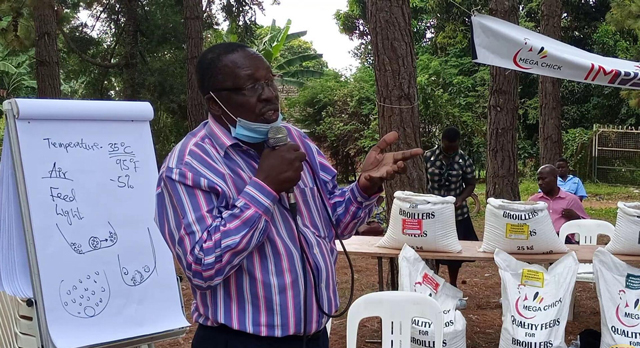
Mukono, Uganda | THE INDEPENDENT | Farmers have been cautioned against producing animal and poultry feeds out of toxic maize that has been rejected on the market.
Uganda’s maize products received strong criticism this month after the Agriculture and Food Authority-AFA in Kenya banned imports from Uganda on account that they contained aflatoxins, which were dangerous for human health.
Aflatoxins result from moulding on grain caused by poor storage of foodstuffs in warm and humid conditions, and to a lesser extent, planting of affected seeds. In the process, the grain is contaminated with poisonous compounds known as Mycotoxins.
But Agricultural Officers in Mukono fear that whenever there are such setbacks in trade, dealers end up selling the less quality maize at cheaper prices to farmers who produce feeds for animals and poultry. A Veterinary Doctor Steven Lule Kibuuse, says that feeds contaminated with aflatoxin affect the production and weight for both poultry and piggery which are commonly fed on maize brand.
“They will develop stunted growth, lose weight and accumulate bills for treatment at the farmer’s side which affects the output in terms of production. In poultry, the egg production rate will reduce, pigs lose fertility and once the situation is poorly managed can cause unexpected death.”
Dr Kibuuse also cautions farmers against planting affected maize seeds because these also retain the poisonous carcinogens that are produced by moulds. These poisonous chemicals will remain and grow in soil, contribute to the decaying of vegetation, hay and grains and in the end, affect yields.
Ronald Musoke, a Mukono-based poultry farmer says that sometimes it becomes hard for farmers to avoid such produce after investing in several other expensive requirements needed for productive poultry keeping.
The Mukono District Veterinary Officer David Kiryabwiire advises farmers to always involve veterinary and extension workers in the process of producing animal and poultry feeds for proper guidance and examination. “We should not wait for our products to be rejected on the international market to wake up for the better but also to change our wellbeing,” he said.
********
URN
 The Independent Uganda: You get the Truth we Pay the Price
The Independent Uganda: You get the Truth we Pay the Price

